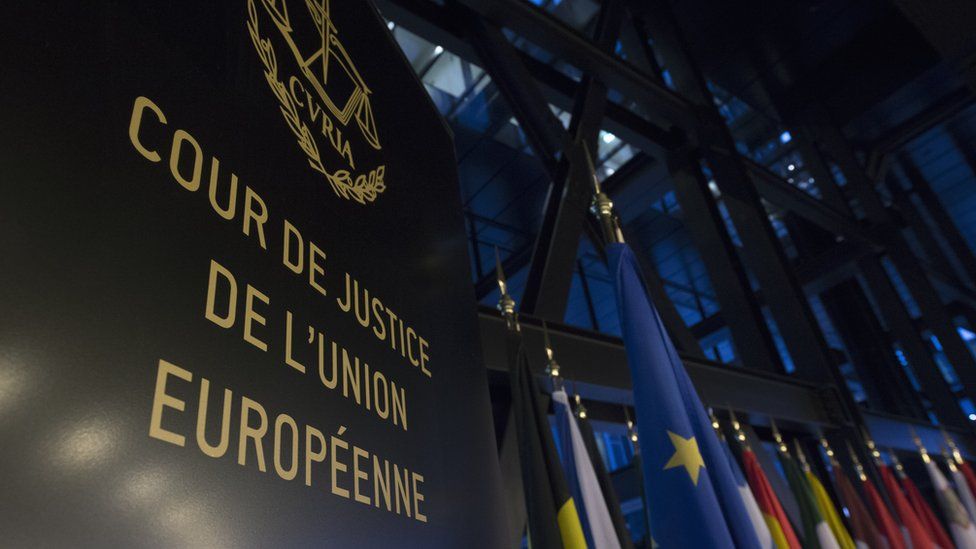Does the EU impact on UK sovereignty?
- Published

Explaining why he wants the UK to leave the EU, Boris Johnson complained about "a slow and invisible process of legal colonisation, as the EU infiltrates just about every area of public policy".
There is no doubt that the 28-member EU has come a long way since six European countries founded the European Economic Community in 1958.
Their aim was to avoid another devastating war in Europe by making its countries economically interdependent.
But what began as a purely economic union has become an organisation responsible for many different areas of policy, from agriculture to transport.
At the heart of the EU are laws designed to allow most goods, services, money and people to move freely within EU member states.
The European Commission - the EU's administrative arm - is responsible for proposing and drafting EU legislation.
If draft proposals are approved by the European Parliament, representing EU citizens, and the Council of Ministers - representing member states - then the proposals become law.
The two most common types of EU laws are known as regulations and directives.
Regulations have direct and immediate effect within EU member states once they have been brought into effect at EU level.
Directives set out an EU objective, which individual countries must transpose into national legislation.
The difference can be seen in examples provided by the EU's own website.
When the EU wanted to make sure there were common safeguards on goods imported from outside the EU, it adopted a regulation.
When the EU wanted to strengthen rights for consumers across the EU - for example, by eliminating hidden charges and extending the cooling-off period - it adopted a directive.
EU law is interpreted by the Court of Justice of the European Union in Luxembourg - or the European Court of Justice, as it used to be called.
This is completely separate from the European Court of Human Rights in Strasbourg, which interprets the European Convention on Human Rights.
However, the EU has its own Charter of Fundamental Rights.
EU institutions such as the commission, the parliament and the council are legally bound to uphold rights in the charter - as are EU governments whenever they apply EU law.
The EU court in Luxembourg interprets EU law to make sure it is applied in the same way in all EU countries and settles legal disputes between national governments and EU institutions.
Member states are required to comply with the court's rulings, and may be fined if they do not do so.
Impact on UK
But there are limits to the EU's powers, of which the most obvious is language.
Although a common language would undoubtedly help improve trade there are no plans to impose one across Europe.
Nor has the EU tried to change the constitutional structures of its member states.
EU summits are attended by presidents, prime ministers and chancellors who lead countries with very different legal systems.
All the EU can do is to ensure that its members meet common standards of justice and democracy.
The EU's powers to make and enforce laws have a bearing on the UK's sovereignty.
When we speak of the sovereignty of Parliament, we mean the right of the House of Commons and the House of Lords - with the formal approval of the monarch - to make any laws Parliament may choose.
Parliament can be said to have given up some of its sovereignty when it passed the European Communities Act 1972, enabling the UK to join what was then the European Economic Community, at the beginning of 1973, and requiring courts in the UK to apply EU law.
Michael Gove, who also wants to leave the EU, explained at the weekend what he saw as the consequences of EU membership.
He said the UK government "cannot remove or reduce VAT, cannot support a steel plant through troubled times, cannot build the houses we need where they're needed and cannot deport all the individuals who shouldn't be in this country".
But David Cameron took a different view of sovereignty in his interview with Andrew Marr.
"Sovereignty really means: are you able to get things done? Are you able to change things, to fix things?
"You might feel more sovereign, but if you can't get your businesses access to European markets, if you can't keep your people safe… you're less in charge of your destiny."
The prime minister also promised proposals to make clear that Parliament was sovereign.
However, his proposals are not expected to include legislation.
If Parliament is not already sovereign, then saying so will not change anything; and if Parliament is already sovereign, there seems little point in declaring it.
Mr Cameron told Parliament the agreement reached in Brussels last week would give the UK a "special status" within the EU and ensure it never became part of a European super-state.
However, those who want to leave the EU say the only sovereignty that matters is the ability to make all our laws in the UK.
And if that's what sovereignty means, it's difficult to see how it can be achieved while the UK remains part of the EU.
- Published6 September 2013